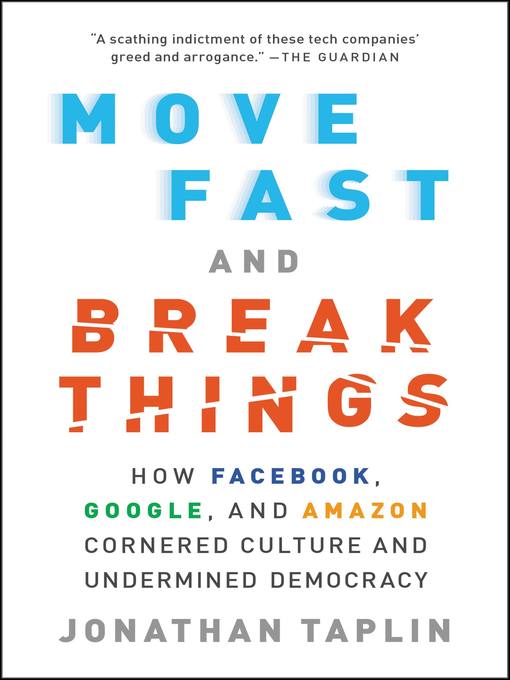
Move Fast and Break Things
How Facebook, Google, and Amazon Cornered Culture and Undermined Democracy
کتاب های مرتبط
- اطلاعات
- نقد و بررسی
- دیدگاه کاربران
نقد و بررسی

February 27, 2017
In this insightful analysis of the intersection of technology and culture, Taplin, director emeritus of the University of Southern California’s Annenberg Innovation Lab and a longtime figure in the music and movie industries, explains how the rise of modern Internet monopolies has changed the face of information and entertainment. “The rise of the digital giants is directly connected to the fall of the creative industries in our country, ” he argues as he explores the rise of the Internet, the emergence of new media platforms, and the legacy of the influential players who shaped the way we conduct ourselves online. His focus is on Facebook, Google, and Amazon and the way they gather and sell information, but he also goes back to the earlier days of Napster and other pirate sites to show how the convenience of file sharing affected the entertainment industries as a whole, and likewise looks at how social media affected the 2016 election. The book reads like a collection of essays revolving around a series of related topics; the sections never form a coherent, cohesive whole. Taplin provides a keen, thorough look at the present and future of Americans’ lives as influenced and manipulated by the technological behemoths on which they’ve come to depend. His work is certainly food for thought, even if he’s a little unfocused.

March 1, 2017
When American representative democracy collapses, blame it on Facebook.The internet can be used for immoral purposes, writes tech pioneer Taplin, director emeritus of USC's Annenberg Innovation Lab, from selling drugs and pornography to enabling the piracy of intellectual property. It can also be used to do good, enhancing the economies of remote places by linking them to the world. But if it is largely amoral, that, by Taplin's account, owes little to those who are making fortunes on the Web by controlling and selling information and ransoming eyeballs. Among Taplin's heavies are Facebook, Google, and PayPal, as exemplified by founders and executives Mark Zuckerberg, Larry Page, and Peter Thiel, the last of whom emerges as a kind of dark lord of the Hobbesian, libertarian internet (a characterization echoed by other observers). Google enables piracy, guiding readers to sites where albums and movies can be downloaded. Though hiding behind a do-no-evil mantra, Google could simply stop listing pirate sites just as it stopped listing illegal drug sites--"after it paid a $500 million fine for linking" to them. What does all this have to do with democracy? For one thing, it promotes inequality--and, as Taplin notes, with Robert Bork's "protrust" view of antitrust laws now dominant in legal and governmental circles, monopolies are often encouraged rather than prohibited. For another, it narrows choice despite the seemingly endless offerings of Amazon, Wal-Mart, et al. The author offers a modest program of resistance, among whose planks is the interesting notion that creators, especially musicians, would do well to follow the Sunkist model, forming cooperatives to control their works just as citrus growers banded together in common interest. "I have no illusion that the existing business structures of cultural marketing will go away," he writes, "but my hope is that we can build a parallel structure that will benefit all creators." A powerful argument for reducing inequality and revolutionizing how we use the Web for the benefit of the many rather than the few.
COPYRIGHT(2017) Kirkus Reviews, ALL RIGHTS RESERVED.

May 15, 2017
Taplin's (director emeritus, Univ. of Southern California Annenberg Innovation Lab) prose is like a web search: he pulls in multiple topics, uses frequent citations, and fires ideas at lightning speed. In the end, readers understand how this swirl of ideas, facts, and mistruths describe Facebook, Google, and Amazon as anarcho-libertarian economic monopolies. Lawless digital companies steal, hoard, and sell popular culture. Online monopolies rob artists, writers, and musicians of payment and sell information that online users unwittingly provide for free. Libertarian robber barons such as PayPal founder Peter Thiel, Larry Page of Google, and Facebook creator Mark Zuckerberg, worship unregulated online and real-world markets, and fiercely fight any attempt at democratic control. The dream of an Internet of ideas has morphed into an intrusive and spectacularly profitable market for those who possess digital content. VERDICT This fast-paced dissection of the inner workings of the Internet will fascinate anyone using it--and make them want to drop off the grid.--Duncan Stewart, Univ. of Iowa Libs., Iowa City
Copyright 2017 Library Journal, LLC Used with permission.

























دیدگاه کاربران